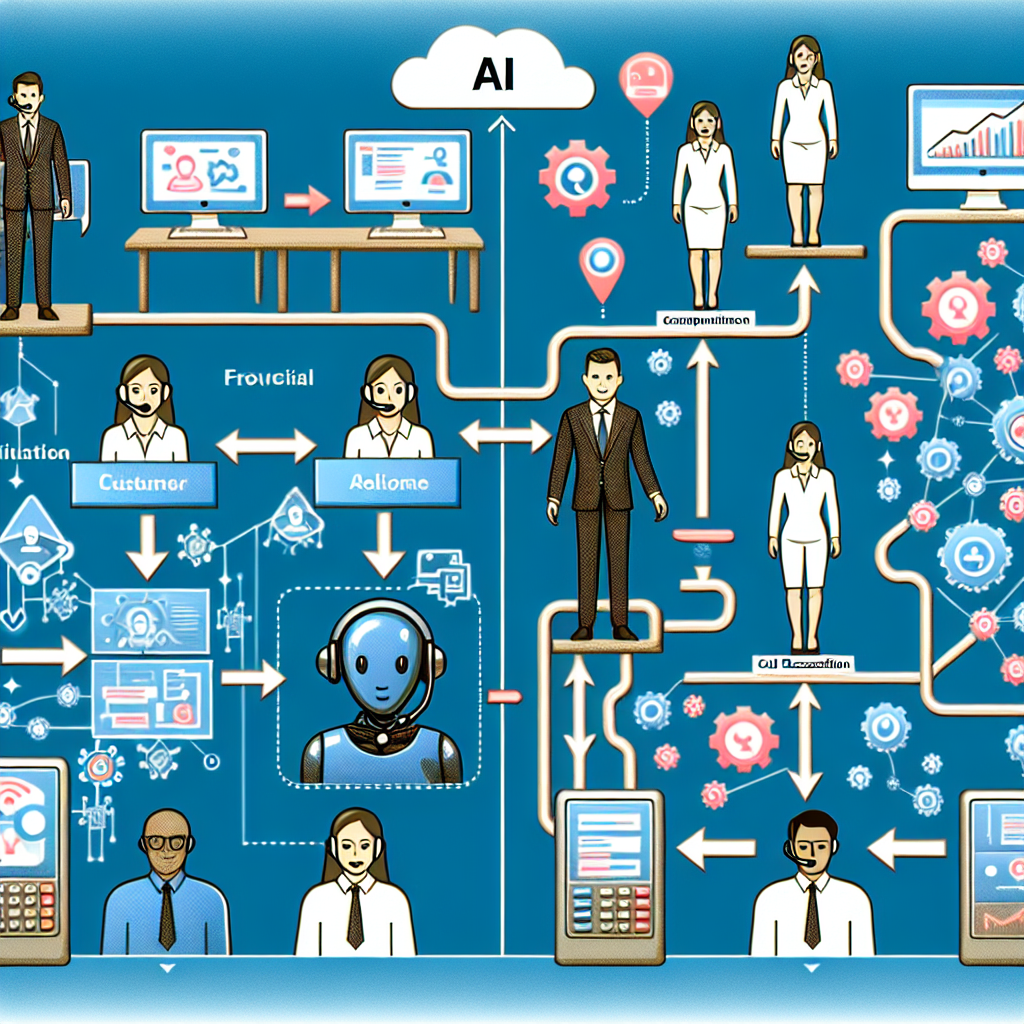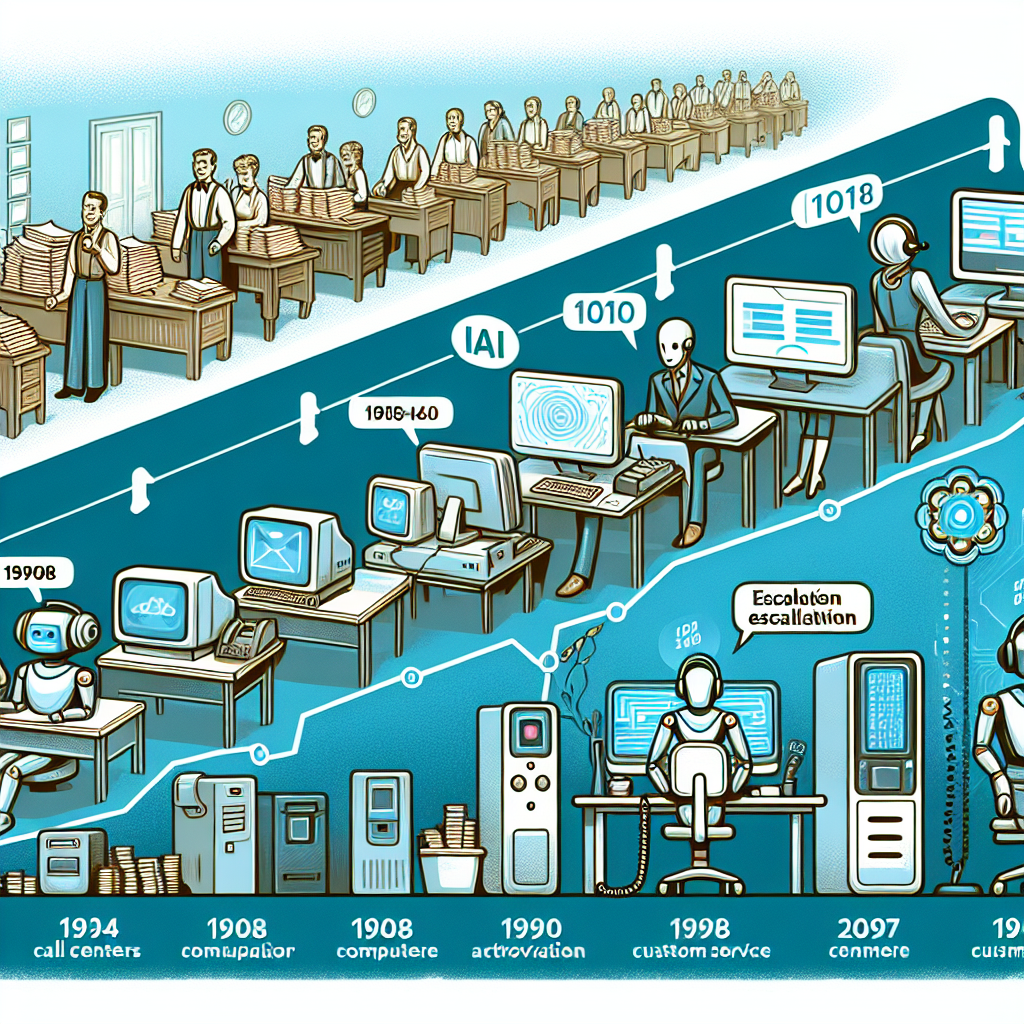
In today's competitive business environment, customer service is a paramount consideration for companies across all sectors. A critical component of superior customer service is effective Call Escalation Management, particularly in call centers. Here, Artificial Intelligence (AI) is making rapid strides.
AI's primary function in managing call escalations is to enhance the customer's experience while boosting operational efficiency. The use of AI technologies, like Natural Language Processing (NLP) and Machine Learning (ML), allows quicker, streamlined identification and routing of escalated calls, leading to significant cost savings and improved customer satisfaction.

With AI's ability to analyze tremendous amounts of data quickly, it predicts the likelihood of a call requiring escalation based on factors such as the customer’s tone, chosen words, and historical interaction data. Advanced routing then ensures the call is directed to the most suitable resource - be it a supervisor, a specialized team, or even an automated response system for uncomplicated issues.
Furthermore, AI's machine learning algorithms continually evolve and adapt, enabling them to make increasingly accurate predictions over time. This results in a dynamic and responsive system that continuously improves its ability to handle call escalations effectively. The advent and proliferation of AI in Call Escalation Management mark a significant stride in the ongoing journey to optimize customer service standards.
In the age of unrivaled digital advancement, AI (Artificial Intelligence) is transforming the landscape of customer service. A crucial aspect of this evolution is the ability to effectively manage call escalations to supervisors or specialized teams. AI's impeccable precision enables it to detect and evaluate escalation triggers. This ensures invaluable time-saving and optimizes the deployment of human resources within a customer service environment.
Contradictory to human perception, AI is an indispensable tool for dynamic customer service. Its application transcends beyond just a simple answering machine or chatbot. AI systems can be trained to understand customer sentiments and harness deep learning to identify triggers for call escalation.
For instance, AI can accurately pinpoint signs of a customer's escalating frustration during a call, such as changes in tone, increased voice volume, and the usage of certain keywords. By recognizing these potential escalation triggers, AI comes into play by immediately alerting a supervisor or redirecting the call to a specialized team that can handle such situations. This immediate and proactive response reflects a highly efficient customer service, which results in increased customer satisfaction and engagement.
Simultaneously, AI provides an excellent learning opportunity for customer service teams. By analyzing these triggers, service providers can gain insights into customer behaviors and the common issues that lead to call escalations. This, in turn, allows for improved training methods and procedures to prevent future customer dissatisfaction and escalations.
In conclusion, AI is a formidable ally in managing call escalations by identifying and evaluating triggers in real-time. By integrating AI into the workflow, companies can personalize their customer service on an unforeseen scale and guarantee proactive, seamless resolution of issues.
For years, call centers have relied heavily on traditional telecommunication infrastructure in managing customer queries and complaints. However, with the advent of Artificial Intelligence (AI), businesses have found new ways of satisfying their customers, not least by automating call escalations. Nonetheless, integrating these AI-driven tools into existing systems raises concerns about interoperability and system compatibility. Let's explore the technical challenges involved and consider ways around them.

In order to effectively integrate AI tools such as chatbots or voice recognition software into existing systems, businesses must first ensure their current infrastructure supports the platforms in which these tools are built. For instance, AI software built on Python or Java platforms would require corresponding runtime environments. Ensuring such compatibility may necessitate system upgrades or even complete overhauls to secure seamless functionality.
The next step is ensuring interoperability. Here, the focus is on enabling the AI tools and the existing telecommunication systems to communicate effectively. This involves establishing suitable interfaces between the systems. Effective system integration ensures the AI tool can trigger escalations at the right time, optimizing the customer experience and significantly reducing customer wait times.
Another aspect of integration pertains to data. AI tools require access to vast amounts of data in order to function properly. Therefore, integrating AI with existing systems also involves creating robust data links and pipelines for efficient data transfer and processing. These ensure the AI systems function effectively and are able to handle large volumes of calls that come their way.
Overall, the integration of AI tools into existing telecommunication infrastructures, if done well, can revolutionize the management of call escalations, providing better service to customers and a more efficient work environment for call center operators. However, as noted, this process requires careful planning and execution to ensure seamless interoperability and system compatibility.
In recent years, AI has proven itself as a highly beneficial tool in handling the mounting challenge of call escalations. This article presents a series of case studies highlighting the transformative impact AI has had on call centers with respect to escalation management across different industries.
Telecom Italia, a leading telecommunications business, witnessed improved response times as a direct result of incorporating IBM Watson into their escalation processes. Watson's Machine Learning capabilities efficiently identified escalating issues, connecting callers to specialized teams. As a result, the company saw an improvement of 30% in first call resolution rates, and a drastic reduction in call transfer rates.
Another striking example is Telstra, Australia's largest telecom operator. They utilized Salesforce's AI tool, Einstein, to optimize their escalation administration. Einstein's predictive insights helped Telstra anticipate possible escalations, diverting them to an apt department before reaching a boiling point. This cut down Telstra's call handling time by 15%, ramping up their customer satisfaction score considerably.
In the finance sector, NLP Logix delivered a striking AI solution for a debt collection agency grappling with messy escalation chains. The AI was tailored to interpret the caller's sentiments and escalation propensity, determining whether it needed to go to a supervisor. This implementation led to a 25% drop in unnecessary supervisor escalations, freeing up valuable resources.
These are just few of the countless success stories demonstrating how AI has revolutionized escalation management, resulting in reduced handling times, better resource allocation, and enhanced customer experiences. Considering the versatility of AI, it can be adapted to meet unique industry or company requirements, making it a game-changer for the future of call escalation management.
In the swiftly expanding landscape of technology, advancements in Artificial Intelligence (AI) are setting up new trends in diverse sectors. A significant realm that is vastly benefitting from AI is call escalation management. Experts predict that AI will heavily influence the future trends in this area by improving customer service sinificantly and streamlining business operations.

The use of AI for managing call escalations to supervisors or specialized teams is still a growing field, but the predictions indicate that advancements in Natural Language Processing (NLP) and Machine Learning (ML) will revolutionize this particular area. NLP with its ability to comprehend and generate human language is expected to improve the efficacy of automated systems in understanding the urgency of a call and making the right decision on escalation. The integration of NLP with customer service can bring significant enhancements in the ease and quality of communication.
On the other hand, ML, gaining insights from vast data to improve its decision-making ability, is perceived to provide more accurate predictions about call duration and caller satisfaction. Consequently, it can assist in managing resources more efficiently by directing calls to supervisors or specialized teams when needed.
Another significant trend that we may witness in future is the rise of 'Autonomous Customer Service Agents'. These AI-infused bots are envisaged to handle more complex tasks than routine queries, thereby reducing the rate of call escalation and ensuring better customer service.
The future role of AI in call escalation management seems bright with the promise of improving call center efficiency, reducing workload on human agents, and enhancing customer satisfaction. However, as these technologies keep evolving, continuous monitoring and regulation will be required to ensure they are used responsibly and to minimize any potential risks.
Implementing AI into call center operations, specifically for managing call escalations, presents a unique set of challenges and considerations. While the potential for efficiency and cost-saving is immense, integrating such technology should be approached with a measured understanding, keeping in mind factors such as ethical implications, necessary training, and the continued necessity for human oversight.
Ethical considerations are paramount when implementing AI, especially in customer service contexts like call centers. With AI's ability to record and analyze vast amounts of data, there are inherent risks to customer privacy and confidentiality. Therefore, it's vital to be transparent about AI use and to employ strict data security measures. Care should also be taken to ensure that AI does not inadvertently inject bias into the customer service process. There are numerous examples, such as the AI bias issues faced by healthcare AI systems, that should serve as potent reminders of the potential pitfalls.
Further, to effectively incorporate AI into the managing call escalations process, adequate training for staff members is a must. Supervisors and specialized teams need to not only understand how to use the AI tools but must also be aware of their limitations and potential workarounds. AI comprehension can significantly optimize business operations during challenging times.
Lastly, despite the rise of AI, human oversight will remain critical. AI can trim down workload and streamline tasks, but it should support rather than replace human expertise. Human interaction is essential to handle complex issues, as well as to provide the empathy and understanding that AI cannot yet replicate. Care should be taken to strike the right balance, with the goal of enhancing rather than replacing the human element of customer service.
In conclusion, while AI offers exciting possibilities for managing call escalations, its integration should be considered and managed carefully. A thoughtful approach will ensure that the benefits of AI are reaped, without compromising ethical standards, training needs, or the importance of human insight within the process.
Start your free trial for My AI Front Desk today, it takes minutes to setup!








